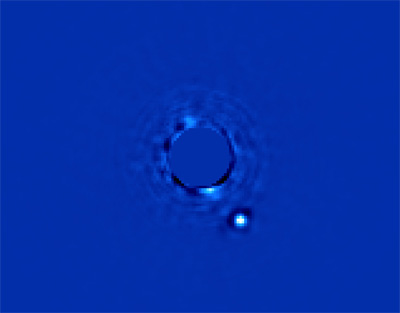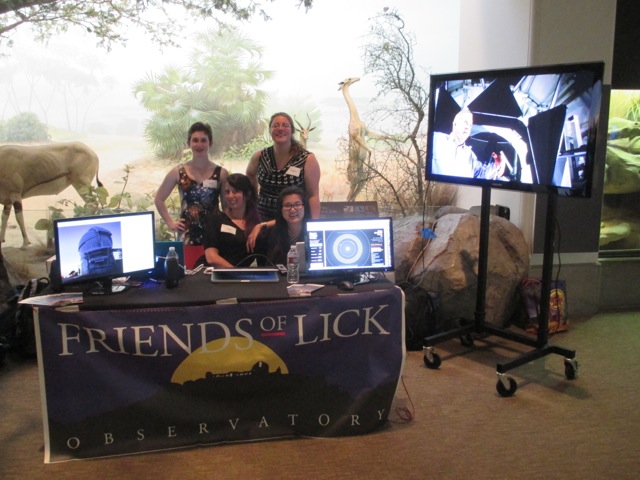-
UC Berkeley Astronomers Lead New NASA-Funded Search for Habitable Planets
April 22, 2015
Department of Astronomy faculty member James Graham will lead one of the 16 new projects funded by NASA in efforts to streamline the search for habitable planets. The project is part of the newly announced NExSS (Nexus for Exoplanet System Science) which seeks to bring together "the best and the brightest" to oversee the search. The Berkeley "exoplanets unveiled" project, which will work alongside scientists at Stanford, is unique due to it's involvement of the "Gemini Planet Imager, a new instrument for the Gemini Observatory that began its exoplanet survey in November 2014; GPI has already imaged two previously known exo-planets and disks…
Tags:More -
Berkeley Participates in Yuri’s Night Celebration at CalAcademy
April 16, 2015
Every year in April a world-wide celebration is held to honor Yuri Gagarin, the first human being to venture into space. This year, members from the UC Berkeley Department of Astronomy took part in honoring this historical achievement with a Yuri's Night celebration at the California Academy of Sciences. Graduate students Erik Petigura and Jason Wang managed telescope viewings on the Academy's living roof, while graduate student Lauren Weiss helped manage the Friends of Lick Observatory table in the African Hall. The table was set up with a live feed and prerecorded footage to the APF (the Automated Planet Finder) and included the Superplanet…
More -
CalDay 2015!
March 23, 2015
CalDay 2015 is almost here! On April 18th the campus opens up to the public for hands-on activities, lectures, presentations, tours, food, and other opportunities to engage with the campus community. The Astronomy department is hosting a number of events; see below for a complete listing so you can plan out your day! Are We Alone?: SETI@home & the Search for ET Hear about Berkeley's SETI (Search for Extraterrestrial Intelligence) program at the world's largest telescopes. Volunteers have a small-but-captivating chance that their computer will detect the first signal from a civilization beyond earth. 11:00-12:00, 3 Leconte - Dan Werthimer “Pluto, Ceres, and Below: What…
Tags:More -
New Instrument Extends the Search for Extraterrestrial Intelligence to New Realms
March 23, 2015
From Astronomy Magazine: "Astronomers have expanded the search for extraterrestrial intelligence into a new realm with detectors tuned to infrared light. Their new instrument has just begun to scour the sky for messages from other worlds. “Infrared light would be an excellent means of interstellar communication,” said Shelley Wright from the University of California (UC) in San Diego who led the development of the new instrument while at the University of Toronto’s Dunlap Institute for Astronomy & Astrophysics. Pulses from a powerful infrared laser could outshine a star, if only for a billionth of a second. Interstellar gas and dust…
More -
Distant Supernova Split Four Ways by Gravitational Lens
March 6, 2015
From release by Robert Sanders: "Over the past several decades, astronomers have come to realize that the sky is filled with magnifying glasses that allow the study of very distant and faint objects barely visible with even the largest telescopes. A University of California, Berkeley, astronomer has now found that one of these lenses – a massive galaxy within a cluster of galaxies that are gravitationally bending and magnifying light – has created four separate images of a distant supernova. The so-called “Einstein cross” will allow a unique study of a distant supernova and the distribution of dark matter in…
Tags:More -
Meet Dan Werthimer
February 23, 2015
Watch the Berkeley SETI Research Center's video profile for Dan Werthimer, Chief Scientist and co-founder of SETI@home and long-time department member! Courtesy of the Berkeley SETI Research Center, Chris Schodt, and Steve Croft.
More -
Campbell Hall Construction Time Lapse
February 19, 2015
Courtesy of UC Berkeley Real Estate.
More -
Astronomers, Physicists Celebrate as Campbell Hall Rises Again
February 19, 2015
After years of planning and construction, Campbell Hall (home of the Department of Astronomy) held it's official dedication ceremony last week. Donors, architects, and other project contributors were thanked during the event by speakers that included the new dean of physical sciences Frances Hellman, former Executive Dean Mark Richards, and Chancellor Nicholas Dirks. Campbell Hall is the result of numerous funding efforts and campus collaborations, including the securing of grants, state-funding, and generous gifts from donors who were eager to invest in the new building. As the new occupants of Campbell Hall, the Department of Astronomy is already looking forward…
Tags:More -
Google gives Lick Observatory $1 million
February 13, 2015
Copied from original article located here. By Robert Sanders - February 10th 2015 Google Inc. has given $1 million to the University of California’s Lick Observatory in what astronomers hope is the first of many private gifts to support an invaluable teaching and research resource for the state. The unrestricted funds, spread over two years, will go toward general expenses, augmenting the $1.5 million the UC Office of the President gives annually to operate the mountaintop observatory for the 10-campus UC system. “Lick Observatory has been making important discoveries while training generations of scientists for more than 100 years,” said Chris…
More -
The Raymond and Beverly Sackler Distinguished Lecture in Astronomy
November 14, 2014
The Department of Astronomy presents: The Raymond and Beverly Sackler Distinguished Lecture in Astronomy "A Decade at Saturn" with Carolyn Porco, Director of the Cassini Imaging Central Laboratory for Operations Wednesday, January 28th, 2015 5:00pm Lecture Sibley Auditorium, Bechtel Engineering Center UC Berkeley
More







